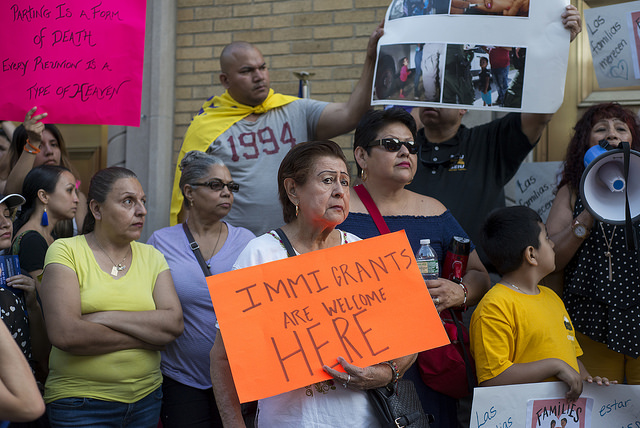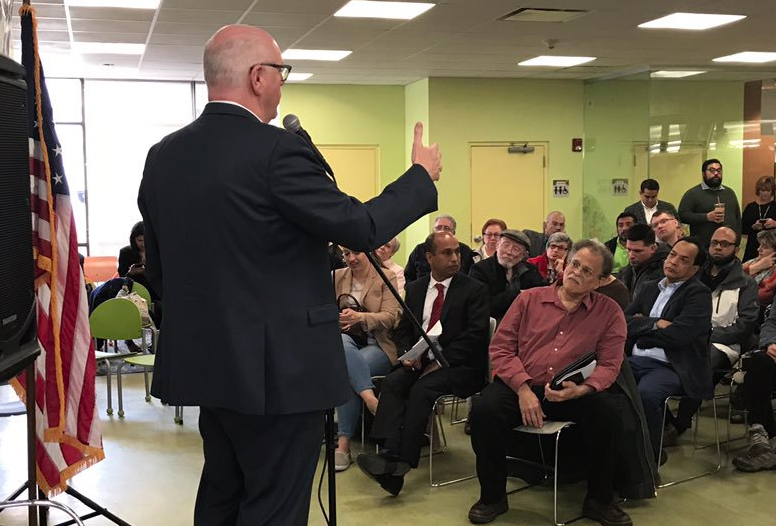Bridging the Achievement Gap Through Real Renewal

(Photo: Michael Appleton/Mayoral Photography Office)
When the New York State Board of Regents met last month, the mood was despondent. “The needle hasn’t moved for minority children in decades,” said Regent Kathy Cashin, decrying the racial achievement gap on the newly-released 2018 state exam scores for students in grades 3-8. The reaction of the Regents ran the usual gamut of hand-wringing, blaming the tests, and calling for more dilatory “analysis.”
And then came the damning report in The New York Times on the failure of New York City’s Renewal schools program. After investing $755 million—nearly the entire annual budget of the San Francisco Unified School District—in the academic improvement of the 94 lowest performing schools, the needle has barely moved there either.
Why the hand-wringing, and why the wasteful investment in programs doomed to fail, when the achievement gap can be closed—for this generation, and with current resources?
Charter schools are dramatically outperforming traditional district schools in the city. In school year 2017-18, New York City public charter schools, enrolling 91% percent children of color, vastly outperformed the rest of the state in both English Language Arts (ELA) and math proficiency, 57 percent to 45 percent and 60 percent to 45 percent, respectively.
Our practices vary, and we don’t always agree on policies. But collectively we are offering a brighter future to 100,000 city students.
Students who attend Ascend Public Charter Schools—a network of 12 schools in central Brooklyn’s most challenged communities—are proving what’s possible.
Brownsville, where we operate five schools, is a community of tremendous potential, but blighted by failed schools. The incarceration rate is the second-highest in the city and a mere 26% of students were found proficient in English. Yet our 5,000 students, 96 percent of whom are black or Latino and 83 percent of whom are from low-income families, not only closed but reversed the achievement gap. Ascend’s African-American students outperformed white students statewide by 7 percentage points in ELA and 2 points in math.
Eschewing the harsh disciplinary practices of “no excuses” schools, Ascend schools offer a rich liberal arts education in a supportive and joyful environment. As our results have climbed, suspension rates have plummeted, down 40% in our lower schools in four years and 28% percent in middle schools.
We commit to making every child feel welcome and cherished. We don’t select students on the way in, nor on the way out. Some, including those affected by homelessness and other traumas, are afforded individual attention for years, and then blossom.
Our schools accomplish all this while holding true to our deepest commitment: to operate truly public schools that enroll all students and operate at district funding levels. All students are enrolled strictly by lottery, we charge no tuition or fees, and most important, we fill every vacant seat through grade 9.
We are but one example of successful charter education. Other networks are posting results as exciting. We are not stuck in the transformational “ice age” that Regent Luis Reyes bemoaned at the recent Regents meeting. Our students—New Yorkers’ students—are not consigned to lives where promise is crushed.
Our education officials are staring a solution in the face.
Yet charter growth may soon stall because of an artificial statutory cap on the number of new charters; only a handful now remain to be awarded statewide. Why not lift the cap? Why not have charters run even half of the Renewal schools to test our methods? Why limit our children’s potential?
***
Steven Wilson is founder and chief executive officer of Ascend Charter Schools.
***
Have an op-ed idea or submission for Gotham Gazette? Email This email address is being protected from spambots. You need JavaScript enabled to view it.
Protect New Yorkers from Washington’s Cruel Actions, Oppose ‘Public Charge’ Change

(photo via the New York City Council)
When we look from our community in Brooklyn to the New York Harbor, we see the Statue of Liberty, a tangible symbol of America’s great tradition of welcoming immigrants seeking to make a better life. Every day in Sunset Park, Red Hook, Bay Ridge, and elsewhere in Brooklyn we see the contributions new Americans are making to the economic and cultural vitality of our neighborhoods, just as generations of immigrants before them contributed.
But America’s great tradition of diversity and inclusion is under attack by the Trump Administration. From separating parents and children at the border, to travel bans and demonizing immigrants as “others,” this administration is on a campaign to sow division and disunity. The latest salvo in this war against new Americans is a radical proposal to expand the definition of “public charge” and undermine pathways to U.S. citizenship for new Americans.
If the government determines that a person is likely to depend on the government as their main source of support (in other words, to be a “public charge”), it can deny that person admission to the United States or lawful permanent residence. Under the Trump Administration’s new “public charge” proposal, immigrants’ participation in some of the most fundamental programs essential for families’ and children’s health and well-being would count against their chances to enter or remain in the United States. These basic public benefit programs include, among others, the Supplemental Nutrition Assistance Program (SNAP), Medicaid, Medicare Part D, and housing assistance.
The Trump Administration’s “public charge” policy plan represents an unwarranted cost shift from the federal government to state and local governments, to non-profit charities, and to needy families themselves. Denying federal assistance to people when they are in need in no way eliminates hunger, homelessness or deprivation. Our communities will face new burdens in addressing gaps in services.
It is clear that the Trump Administration’s overly broad definition of “public charge” would have far-reaching effects. One in four American children have at least one immigrant parent. In addition to the categories of individuals directly affected by the policy, fear and confusion would cause most immigrants to forgo benefits for all means-tested federal, state, and local programs. The dis-enrollment from public benefits would cause disruption in the lives of millions of needy people, harm individuals’ well-being, and undermine local economies here in New York and across the United States.
We all need to raise our voices against this proposal. And we have an opportunity to do just that. The Trump Administration cannot implement this radical change until after it has considered comments submitted by members of the public. In our democracy, this is an important check on unfettered rulemaking by the executive branch. Help make that check a real one by submitting your comments through regulations.gov by December 10.
Get your neighbors, families and friends to comment as well. Our nation is at its best when people join arms and stand together for the values that have built America.
Join the thousands of people in the Protecting Immigrant Families coalition in speaking out to stop this mean-spirited and harmful potential rules change.
***
Assistant Assembly Speaker Felix W. Ortiz represents parts of Brooklyn. On Twitter @Felixwortiz.
***
Have an op-ed idea or submission for Gotham Gazette? Email This email address is being protected from spambots. You need JavaScript enabled to view it.
Queens needs a democratic Democratic Party

Queens Democratic Chair Joe Crowley (photo: @repjoecrowley)
I canvassed in my neighborhood for the first time this past summer by approaching people on the street asking if they were registered Democrats. One elderly gentleman took a minute to understand what I was saying, but when he heard the word “Democrat” he smiled and said, “I became a citizen of this country. I am proud to be a Democrat,” and excitedly signed my petition. Voters like this man are truly what make our country and party great.
Our party must reflect the community we live in, and the values we share, otherwise there is no reason to be involved in politics. While I live in a welcoming community, like many in Queens and around the city, our politics can be far from inviting.
I first moved to New York City to attend law school at Fordham after spending seven years in Washington, D.C. I was nervous at first about being in a larger city that sometimes felt very impersonal and overwhelming when I had visited in the past, and worried about feeling like an outsider in my new neighborhood. Luckily, my fears were completely unfounded as I became close with several new friends and neighbors in Astoria, Queens. Before long this neighborhood began to truly feel like home.
I’ve always been interested in politics, and this past January decided to join my local Democratic club to meet more like-minded people and volunteer for progressive candidates. After my first few meetings, however, I soon noticed how opaque the processes of the Queens County Democratic Party could be. We are frequently told at these meetings which candidate the Queens Party endorsed for each office, and are recruited to volunteer for that person even if we’ve never heard of them.
Despite a lot of hard work, many of us are in the dark as to how the endorsement and nomination processes work. As a result I began working with another group of local Democratic activists, the New Queens Democrats, which recruited its members to run for the party’s county committee in our neighborhoods, to open up this process.
The county committee, the utmost local form of party representation, ordinarily has thousands of vacant seats, the perfect opening to build change from the ground up in Queens. The platform of New Queens Democrats is straightforward – we call for more transparency and community participation in the party's decision-making so that the party leaders are more accountable to the people they purport to represent.
After collecting signatures throughout our election districts, the New Queens Democrats gathered our petitions and turned them in to the Board of Elections. Surprisingly, our petitions were deemed defective due to minor technical errors, and we went to court. We figured that the Board of Elections, seeing how dedicated we were, would decide to help us correct our petitions so that we could get to work representing our communities on the party committee.
That’s not what happened.
The Board of Elections is made up of ten commissioners who are chosen by the same party officials we were trying to convince to open their doors to us. The Board fought tooth and nail to keep members of the New Queens Democrats off the ballot, using taxpayer money to successfully appeal a court order that had gone in our favor.
Next, an article in the New York Times informed us that the Queens Democratic Party had nominated its own people for positions on county committee, often without the candidates' consent. These “candidates” included a homebound woman in her eighties and a former Queens resident who moved to Florida two years ago – both of whom had no idea they were on the ballot or what the county committee even is.
The final slap in the face came on Election Day. I woke up at 6 a.m. to go to my polling place, where I discovered that I was, in fact, on the ballot (although my name was horrendously misspelled). The momentary excitement of being able to represent this community ended when our attorney reported to us later that day that even though we were technically on the ballot, the Board of Elections would not be counting any of our votes. The Board used the Appellate Division’s order allowing them to keep us off the ballot as justification for not counting the votes, preventing us from joining the committee.
Change is desperately needed, even in one of the most supposedly progressive cities in the United States. Despite all this, I’m very optimistic about the future of our local party. The primary victories of Alexandria Ocasio-Cortez, Jessica Ramos, Catalina Cruz, and John Liu earlier this year have shown that Queens voters will no longer stand for politics dictated by secret handshakes and backroom deals.
Our party must open its doors to all members of our community, with political leadership worthy of the everyday voters who make our neighborhoods strong. The next county committee elections will be in 2020, and we will be ready.
***
Ryan A. Partelow is a member of the New Queens Democrats and a student at Fordham Law School. He lives in Astoria, Queens. On Twitter @RyanPartelow.
***
Have an op-ed idea or submission for Gotham Gazette? Email This email address is being protected from spambots. You need JavaScript enabled to view it.




